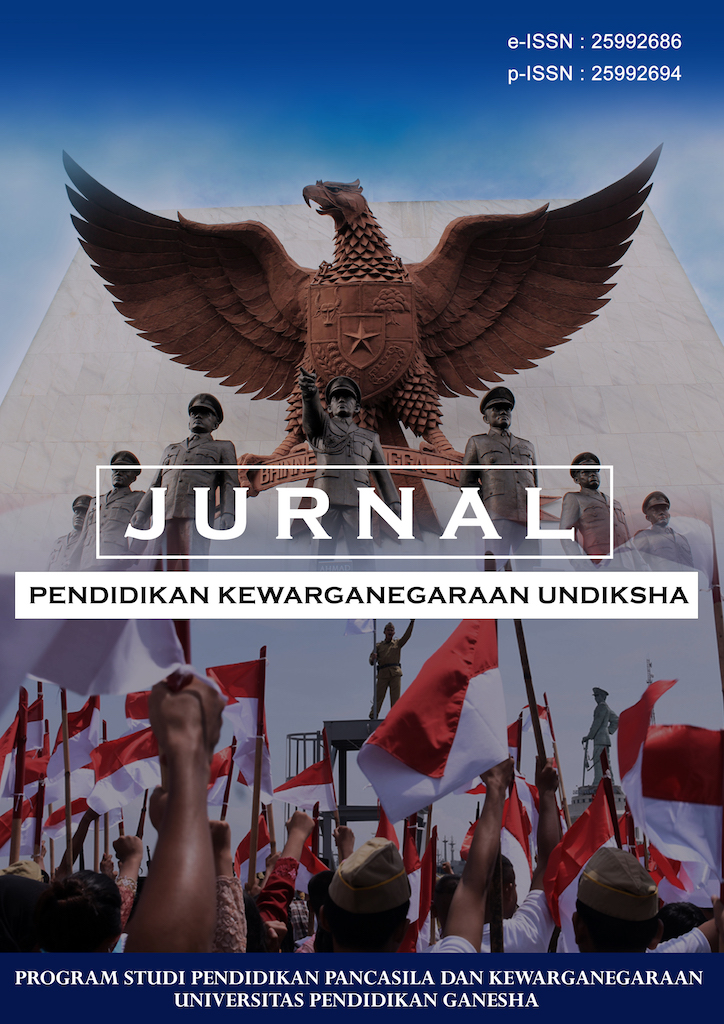TINJAUAN TERHADAP TEORI POSITIVISME HUKUM DALAM SISTEM PERADILAN PIDANA INDONESIA
DOI:
https://doi.org/10.23887/jpku.v9i1.31488Abstract
This study aims to (1) identify and analyze how positivism theory represents the value of justice and legal certainty, and (2) know and analyze how legal theory prevails in Indonesia. This type of research is normative legal research. The data obtained from this research is secondary data obtained through library research, then the data obtained is analyzed juridically qualitatively through a statutory and conceptual approach. The results of this study indicate that (1) In legal positivism, the entire statutory regulation is essentially something that contains the law completely so that the next task of the judge is to apply the provisions of the law mechanically in solving problems in society, in accordance with (2) The conception of the theory of development law is adequate law and does not view law as a set of rules and principles governing human life, but also includes institutional institutions and processes needed to realize the law. become reality. Meanwhile, the Pancasila Legal Theory is a legal theory which is based on the values of Pancasila as the ontological, epistemological and axiological basis based on the principles of Pancasila law.
References
Hardiman, F. Budi. 2003. Melampaui Positivisme dan Modernitas; Diskursus filosofis tentang Metode Ilmiah dan Prolema Moderitas. Kanisius. Yogyakarta.
Nitibaskara, Ronny Rahman. 2006. Tegakkan Hukum Gunakan Hukum. Kompas Media Nusantara. Jakarta.
MD, Mahfud. 2009. Pancasila Dalam Berbagai Perspektif. Sekjen dan Kepaniteraan Mahkamah Konstitusi. Jakarta.
Mertokusumo, Sudikno. 1993. Bab-bab tentang Peneman Hukum. PT. Citra Aditya Bakti. Bandung.
Rahardjo, Satjipto. 2009. Hukum dan Perilaku: Hidup Baik Adalah Dasar Hukum yang Baik. Kompas Gramedia. Jakarta.
Rasjidi, H. Lili. 2009. Dinamika Situasi Kondisi Hukum Dewasa Ini dari Perspektif Teori dan Filosofikal. Bandung.
Shidarta, Arief. 2011. Posisi Pemikiran Hukum Progresif dalam Konfigurasi Aliran-aliran Filsafat Hukum: Sebuah Diagnosis Awal, dalam buku Satjipto Raharjo dan Hukum Progresif Urgensi dan Kritik. Epistema Institute. Jakarta.
Sidiq, Muhammad. 2009. Perkembangan Pemikiran Teori Ilmu Hukum. Prandya Paramita. Jakarta. Soekanto, Soerjono. 2014. Penelitian Hukum Normatif Tinjuan Secara Singkat. Rajawali Pers.
Jakarta.
Sudirman, Antonius. 2007. Hati Nurani Hakim dan Putusannya: Suatu Pendekatan dari Perspektif
Ilmu Hukum Perilaku (Behavioural Jurispudence) Kasus Hakim Bisma Siregar. PT. Citra
Aditya Bakti. Bandung.
Susanto, Anton F. 2010. Dekonstruksi Hukum: Eksplorasi Teks dan Model Bacaan. Genta
Publishing. Yogyakarta.
Unger, Roberto M. 2010. Teori Hukum Kristis. Nusa Media. Bandung.
Warassih, Esmi. 2011. Pranta Hukum Sebuah Telaah Sosoiologisi. Badan Penerbit Undip.
Semarang.
Yusriadi. 2011. Tembaran Pemikiran Kritis Hukum dan Masyarakat. Surya Pena Gemilang
Publishing. Malang.
Downloads
Published
Issue
Section
License
Authors who publish with the Jurnal Pendidikan Kewarganegaraan Undiksha agree to the following terms:
- Authors retain copyright and grant the journal the right of first publication with the work simultaneously licensed under a Creative Commons Attribution License (CC BY-SA 4.0) that allows others to share the work with an acknowledgment of the work's authorship and initial publication in this journal.
- Authors are able to enter into separate, additional contractual arrangements for the non-exclusive distribution of the journal's published version of the work (e.g., post it to an institutional repository or publish it in a book), with an acknowledgment of its initial publication in this journal.
- Authors are permitted and encouraged to post their work online (e.g., in institutional repositories or on their website) prior to and during the submission process, as it can lead to productive exchanges, as well as earlier and greater citation of published work. (See The Effect of Open Access)










